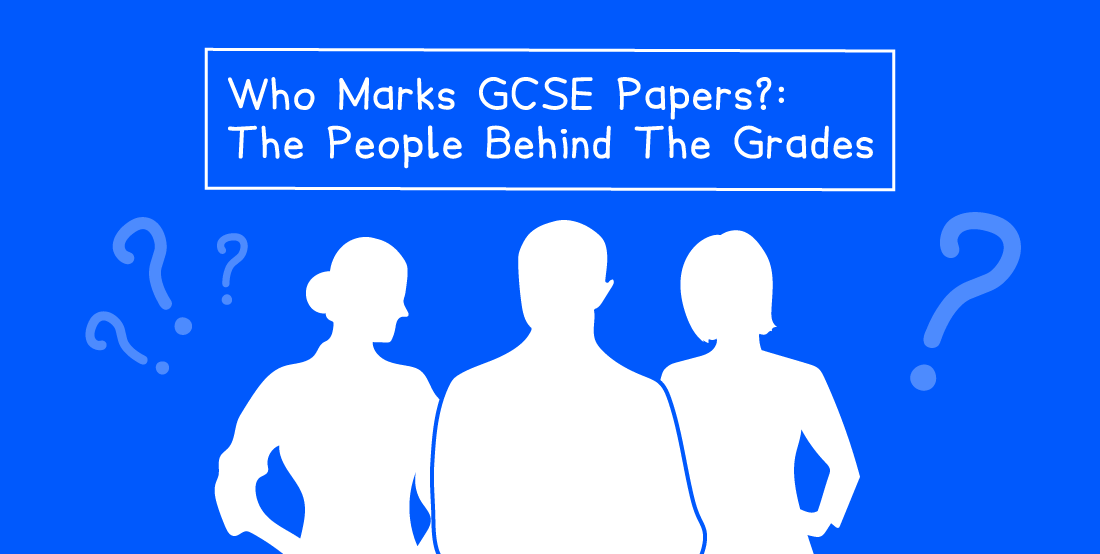Who Marks GCSE Papers?: The People Behind The Grades
Written by: Alexandra Brennan
Reviewed by: Philippa Platt
Last updated

Contents
As GCSE results day approaches, many students find themselves wondering: Who actually marks these papers, and how can I trust the process? It’s a common worry—after months of preparation, your grades rest in the hands of an unseen examiner.
What makes it worse is the lack of clear, accessible information about how the marking system works. Are the people marking your papers qualified? Do they really understand the subject? How can you be sure your hard work is being fairly assessed?
In this article, we’ll demystify the GCSE marking process, explaining who the examiners are, how they’re trained, and what safeguards are in place to ensure accuracy and fairness.
Who Marks GCSE Papers?
GCSE papers are usually marked by qualified teachers with experience of teaching the specific subject/level they are assessing. They generally need to have been teaching the relevant content for at least a year, possibly longer, for some exam boards. This ensures that examiners marking the papers have the expertise and familiarity needed to accurately assess students' work.
The experience and qualifications required by some exam boards includes:
AQA:
Three terms of teaching experience in the subject and level within the last five years
A senior professional referee able to verify relevant experience
Preferably a degree, teaching qualification, or equivalent in your chosen subject(s)
Edexcel:
One academic year's worth of teaching experience in the subject and level within the last eight years
A degree or equivalent
A qualified teacher
Prior to marking GCSE papers, examiners must successfully complete mandatory training. Although it varies with each exam board, a typical process an examiner goes through is:
Familiarisation
The examiner works through the exam paper and mark scheme to familiarise themselves with it. Errors in the mark scheme can be picked up, and any suggestions made before the finalised mark scheme is approved and sent out.
Standardisation
Examiners work through a number of selected answers to check they are applying the mark scheme correctly. The marks they award for each question are compared to those awarded by the senior examiners. Any differences are discussed between an examiner and their team leader to ensure they fully understand the mark scheme.
Marking
Examiners mark a set number of scripts. There are built-in quality checks known as "seeds" to ensure accuracy. These are pre-marked questions embedded within the scripts to check the examiner's consistency. If an examiner’s marks differ from the assigned marks on more than one occasion, they are temporarily stopped from marking that question. They then review the mark scheme with their team leader to address discrepancies. This rigorous process ensures that every script is marked fairly and accurately.
Meet Ric: GCSE Chemistry Examiner

What experience do you have as an examiner?
My experience as an examiner includes:
3 years as an Expert Marker for OCR GCSE Chemistry A Unit 2
12 years of marking experience with Edexcel (GCSE, IGCSE and International A level Chemistry)
3 years of marking exceptions scripts for Edexcel
Exception scripts are full exam papers that cannot be marked digitally. They include exam papers printed on A3 paper for visually impaired students or papers where students have had to use extra sheets of paper. In instances like these, the examiner marks the entire exam paper rather than a set of specific questions.
What qualifications or requirements did you need to become a GCSE examiner?
I had to have a good standard Chemistry degree and a minimum of 2 years teaching experience. I didn’t have any experience of teaching the Edexcel specification, but being an examiner already for OCR helped. The training happens just before marking starts and continues throughout the marking period.
How important is clear presentation when marking exams?
In the hundreds of thousands of answers I have marked over the years, there has only ever been one answer that I really couldn’t read. There have been many that were a challenge but still legible. So, personally I don’t think it is an absolute necessity but it really makes it easier for the examiner if they can read your writing easily and this obviously makes it easier for them to award marks. I find that messy writing is easier to decode than tiny writing, especially as online marking doesn’t make it easy to zoom in without it pixelating.
TIP: I recommend writing as neatly as you can, but write large enough for it to be easily read!
More controversially, I would say that spelling, punctuation and grammar (SPAG) isn’t too important in Chemistry. Your English exams should test your SPAG; your Chemistry exams should test your Chemistry knowledge. This particularly applies to technical terms and keywords.
TIP: If in doubt with spelling, write it out phonetically
e.g. crowmatograffy = chromatography.
As long as your Chemistry examiner can tell what you’re trying to write, you should be awarded the mark. However, there are certain examples where you need to be very clear. For example, depending on your exam board, chemical symbols such as Cu will be scored incorrectly if the ‘u’ looks to be the same size as the ‘C’. Similarly for chemical formulae, the little numbers and +/- should be correct subscripts and superscripts and in the correct place (E.g. water is H2O, not H2O or HO2).
Is there a specific exam technique that sets the top students apart?
One thing that sets top students apart is an ability to identify their weaknesses. They then focus revision on those areas. After all, students don’t usually have one exam to revise for. They have many exams all crammed into a few weeks. So, a student who can identify the things they should revise to gain the most marks is one that will improve more.
To achieve this, I have seen students revise by:
Doing “if this is the answer, what is the question”. This means that they look through a mark scheme and try to work out what the question is. The closer their question is, the better they know that topic. At the end, they have a list of topics that might need more revision.
Doing past papers and marking them. Then compiling a list of mistakes for every past paper so that they can identify common things to revise.
Frequently Asked Questions
Does One Examiner Mark the Whole Paper?
This depends on the exam board and subject. In some cases, one examiner will mark an entire script (e.g. OCR Geography). Other exam boards have examiners marking specific questions (e.g. Edexcel Chemistry). If the paper contains multiple choice questions, these are often marked automatically, not by examiners.
Do You Have to Be a Teacher to Mark GCSE Papers?
In most cases yes, but some exam boards will employ examiners without a teaching qualification as long as they have teaching experience. The majority of exam boards ask for at least one year of teaching experience to mark GCSE papers, and a relevant degree. For some questions, exam boards recruit small numbers of PGCE or PhD students. This is usually due to their academic abilities and familiarity with the subject.
When Do Examiners Start Marking GCSEs?
The paper and draft mark scheme are typically available within a couple of days after the exam. The draft mark scheme is then worked on while the papers are scanned in. Standardisation happens approximately a week after the exam. Live marking happens around 2–3 weeks after the exam.
Ace Your GCSEs with Save My Exams
Save My Exams offers course-specific revision resources, including revision notes, exam questions, flashcards and past papers. We offer these for a range of subjects including Biology, Chemistry, Physics, Maths, English, Geography, History, Computer Science, and Religious Studies.
Explore all our GCSE resources
References
Sign up for articles sent directly to your inbox
Receive news, articles and guides directly from our team of experts.

Share this article


 written revision resources that improve your
written revision resources that improve your